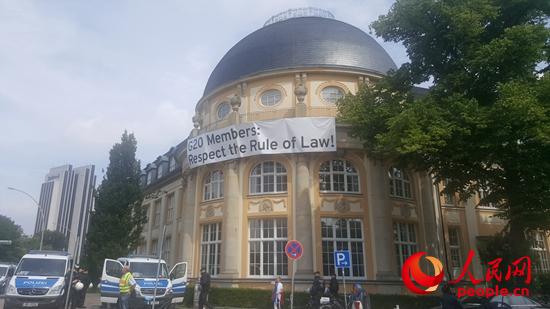Sino-UK aspirations, lament of liberal ideologues: What was learnt from G20
- By Sumantra Maitra
 0 Comment(s)
0 Comment(s) Print
Print E-mail China.org.cn, July 12, 2017
E-mail China.org.cn, July 12, 2017
|
|
|
A protest banner in Hamburg: G20 Members: Respect the Rule of Law! [People.cn] |
The G20 ended, as it began, with a whimper. Other than thousands of protesters burning and looting for three whole nights in Hamburg, showing how impotent German police have become, there wasn’t much headway made at the summit itself -- at least nothing of immediate impact.
I have previously noted how patterns are emerging in world affairs along distinct ideological lines. Some of these were solidified in this particular G20. And, in hindsight, perhaps that will be how this summit will be remembered, as the defining moment when specific patterns of international relations emerged.
To start with, the U.K. and China seem to be forming a partnership for the future, based on economic principles, and it’s in both British and Chinese interests to ensure this is not hampered by geopolitics.
Post-Brexit, as separation talks continue with the EU, Britain is desperately looking for new economic partners, and a free trade deal with the U.S. seems only a matter of time, given the obvious personal chemistry between President Donald Trump and Prime Minister Theresa May.
Meanwhile, President Xi Jinping revealed China’s decision to invest billions to show its continued confidence and optimism in a post-Brexit Britain. He also maintained that it’s imperative that a good deal needs to be there between the EU and the U.K. to help smooth global economic jitters.
Important questions facing British officials concerned alleged dumping of steel as well as concerns over Hong Kong’s future. However, British diplomats understood the hints being dropped, and didn’t press the point. In regard to Hong Kong, the British side accepts that it’s an issue essentially within Chinese sovereignty, and not much can be said or done, nor should be, given the need for Chinese investment in Britain.
The Chinese side also made clear that the core interests and major concerns of each country must be respected, and shouldn’t be interfered with. This is important as China is high on the list of British free trade deals post-Brexit, and cooperation in sectors like research, education, finance and energy is also steadily emerging.
While the massive investment planned in 2016 for start-ups haven’t panned out yet, perhaps due to Brexit uncertainties, it is still a project-in-process.
The second most important thing is the lament of Liberal internationalists both within and outside America regarding perceptions that the U.S. is no longer "leader of the international community."
During the Cold War, America was termed "leader of the free world," symbolizing the "Iron Curtain," an artificial border imposed by ideological differences between Soviet Eastern European and the rest of the European continent.
Those days are obviously long gone; hence, media now usually calls the U.S. leader of the international community. Unfortunately, since Trump’s election, a few dynamics have changed, and it is China and Germany that seem to be leading on an array of free trade and climate issues.
That is not going down well with a certain section of ideologues, who insist on continued American hegemony.
That is understandable. Post-1991, a couple of generations have grown under a unipolar, stable form of international governance. It is a mystery why that was considered as marking the end of change in human history, but it was, nonetheless.
Such people have never understood what multi-polarity is all about and how it creates a need for compromise in international affairs, and are now riled that big powers have emerged to assume leadership in some areas.
Unfortunately, this will persist. However, if the international system’s history is a teacher, powers don’t always remain the same, poles change and hegemons rise and fall. It seems to resemble the end days of the British Empire, when this debate was also fought over within the British bureaucracy.
Post-1945, British diplomats were divided on whether they should accommodate the United States, given their diminished status in world affairs, or should continue acting as a global power. Ultimately after the 1956 Suez crisis, that question was resolved, when Britain finally accepted the imperial days were over, especially as it couldn’t afford for economic and military reasons to continue behaving as before, and, anyway, the British people wanted a significantly diminished role in world affairs.
A similar dilemma now faces American policymakers. The American people want a diminished role, as well as less foreign adventures. Added to that is the emergence of other powers with commensurate interests. It is in American interests to actually accommodate other powers and follow a "Concert of Europe" model. Ideologues should give way to Realists.
Sumantra Maitra is a columnist with China.org.cn. For more information please visit:
http://www.china.org.cn/opinion/SumantraMaitra.htm
Opinion articles reflect the views of their authors only, not necessarily those of China.org.cn.







Go to Forum >>0 Comment(s)